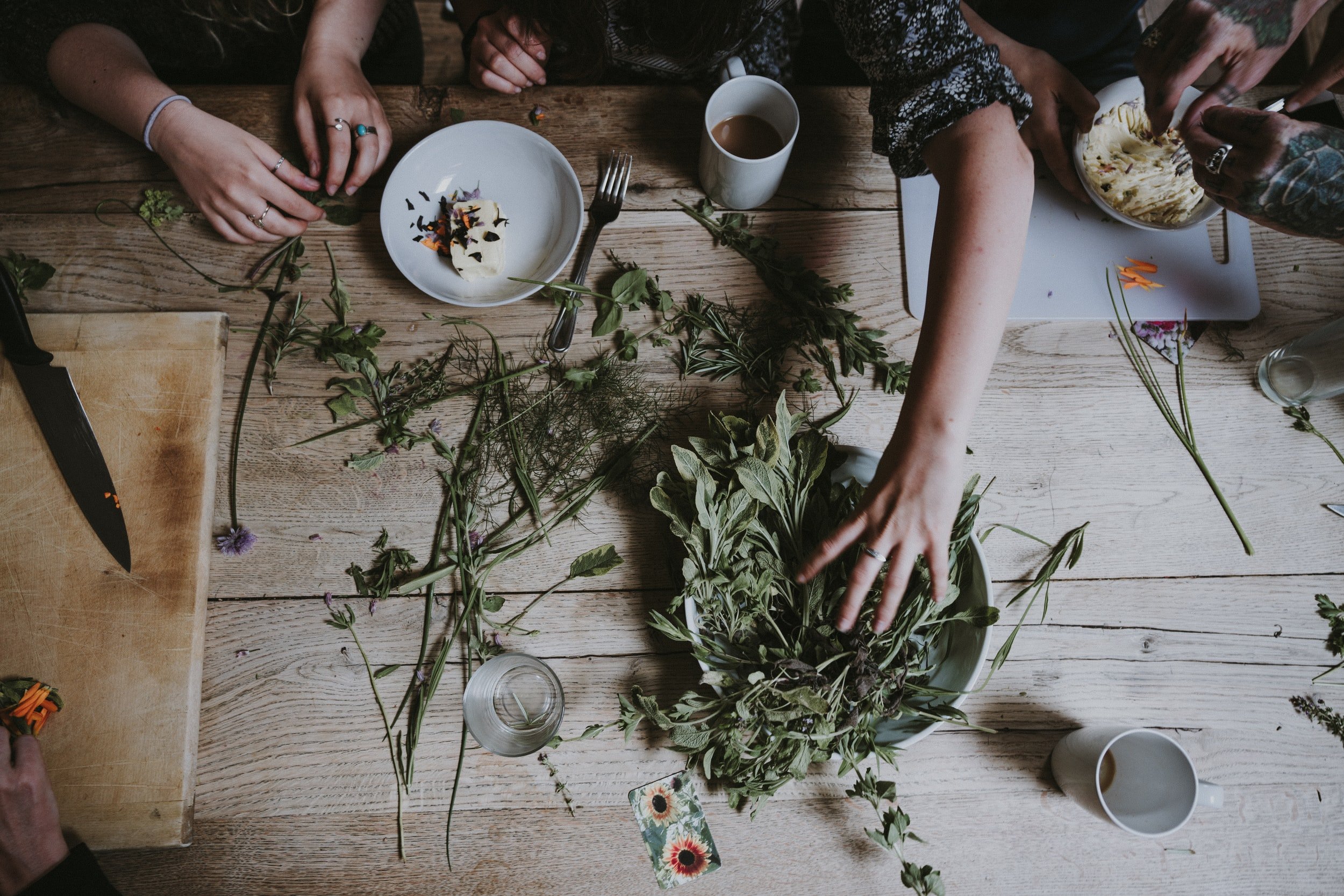Herbal & Aromatic Plants
Plants have been used for therapeutic, religious, cosmetic, nutritional, and beautification purposes since ancient times and humanity of all civilizations and cultures are familiar with their usage. Herbs have been used prevalently as home remedies to treat diseases seasonal like cough, cold, stomach ache etc in several countries of Asia, Africa and Europe.
Vaatalya mountain retreat grows its own natural aromatic & herbal plants. Being part of the Himalayan belt, many of them also grow naturally and cannot be planted. They are used in the food and other experiences at the mountain top community retreat.
Rosemary
Rosemary was traditionally used to help alleviate muscle pain, improve memory, boost the immune and circulatory system, and promote hair growth. Rosemary is a perennial plant (it lives more than 2 years). Possible health benefits include improved concentration, digestion, and brain ageing.
Thyme
Thyme (/taɪm/) is any member of the genus Thymus of aromatic perennial evergreen herbs in the mint family Lamiaceae. Thyme essential oil, which is obtained from its leaves, is often used as a natural cough remedy. In one study, a combination of thyme and ivy leaves helped to alleviate coughing and other symptoms of acute bronchitis. Next time you're faced with a cough or sore throat, try drinking some thyme tea.
Lavender
Lavender oil is believed to have antiseptic and anti-inflammatory properties, which can help to heal minor burns and bug bites. In addition to helping with digestive problems, lavender is used to help relieve pain from headaches, sprains, toothaches, and sores. It can also be used to prevent hair loss. Lavender species are common in herb gardens for their fragrant leaves and attractive flowers.
Flax Seed
Flax (Linum usitatissimum) is an annual plant from the Linaceae family. ... Flax is also called linseed and is an edible seed and oil. It is a good source of Omega-3 essential fatty acids, lignans and soluble and insoluble fibre. Though tiny, they are rich in the omega-3 fatty acid ALA, lignans and fiber, all of which have been shown to have many potential health benefits. They can be used to improve digestive health, lower blood pressure and bad cholesterol, reduce the risk of cancer and may benefit people with diabetes.
Stevia
Stevia is sometimes referred to as meethi tulsi by Indian cultivators. Stevia has no calories, and it is 200 times sweeter than sugar in the same concentration. As a zero-calorie natural sweetener stevia benefits people with diabetes
Turmeric
We grow Turmeric and especially it's most active compound curcumin has many scientifically-proven health benefits, such as the potential to prevent heart disease, Alzheimer's and cancer. It's a potent anti-inflammatory and antioxidant and may also help improve symptoms of depression and arthritis.
Ginger
Ginger has a very long history of use in various forms of traditional/alternative medicine. It has been used to help digestion, reduce nausea and help fight the flu and the common cold, to name a few.
Basil or Tulsi
Basil most popularly known as Tulsi has been used for thousands of years in Ayurveda for its diverse healing properties. The Basil or Tulsi plant has many medicinal properties. The leaves strengthen the stomach and help in respiratory diseases. Kidney Stone: Basil has a strengthening effect on the kidney. Basil plant and its various parts are used in case of insect bite, fever, cardiac diseases, gynaecological disorders, respiratory problems, skin disorders, etc.
Mint
Mint is a calming and soothing herb that has been used for thousands of years to aid with an upset stomach or indigestion. Mint is thought to increase bile secretion and encourage bile flow, which helps to speed and ease digestion (and which may also support healthy cholesterol levels).
Daruhaldi (Berberis aristata) or Indian Barberry
Daruhaldi (Berberis aristata) is used in Ayurvedic medicine for a long time. It has hypoglycemic, antibacterial, antifungal, antipyretic, anti-inflammatory, hepatoprotective and antioxidant activities.
Bergenia ciliata
Bergenia ciliata of family Saxifragaceae is known as Kodiya or Pashanbheda It is a second good source of bergenin after Bergenia ligulata. It has many medicinal properties such as antibacterial, anti-inflammatory, anticancer, antidiabetic. Bergenia ciliata is used mainly for kidney disorder.
Rhododendron
Rhododendron is one of the naturally occurring plants which possess various health benefits, such as prevention and treatment of diseases associated with heart, dysentery, diarrhea, detoxification, inflammation, fever, constipation, bronchitis and asthma [4]. The leaves possess effective antioxidant activity
Vaatalya with its network partners is indulged into preserving, growing and researching on these natural plants. All these plants grow wildly or are planted & nurtured grown in Vaatalya. The founder at Vaatalya has in-depth knowledge of these plants due to their background in Naturopathy & Ayurveda. They utilise their plants in their food & other healing practices.













